人教版高二英语必修5 Unit1 Great Scientists Grammar 过去分词作定语课件(共50张PPT)
文档属性
| 名称 | 人教版高二英语必修5 Unit1 Great Scientists Grammar 过去分词作定语课件(共50张PPT) | 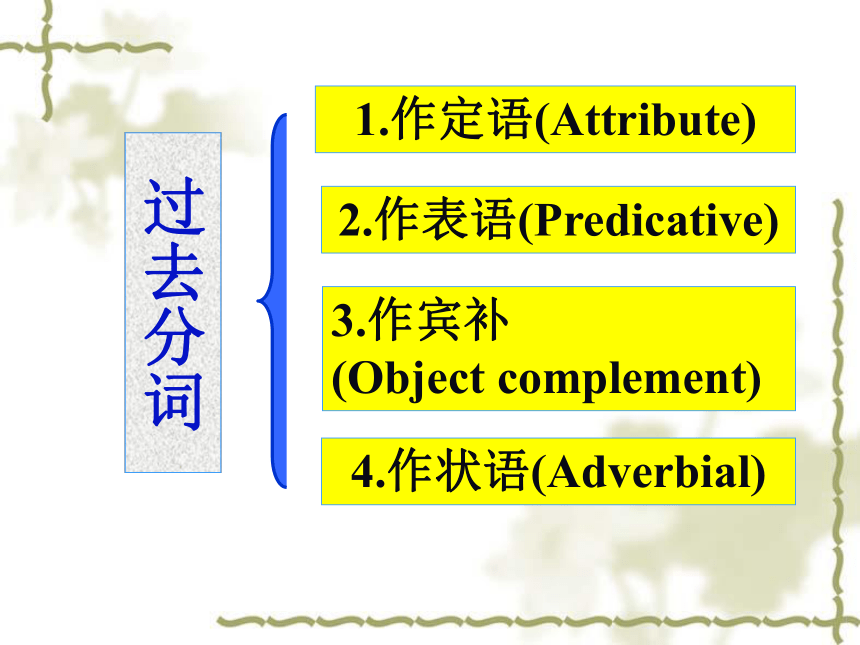 | |
| 格式 | ppt | ||
| 文件大小 | 440.5KB | ||
| 资源类型 | 教案 | ||
| 版本资源 | 人教版(新课程标准) | ||
| 科目 | 英语 | ||
| 更新时间 | 2020-09-20 10:52:43 | ||
图片预览


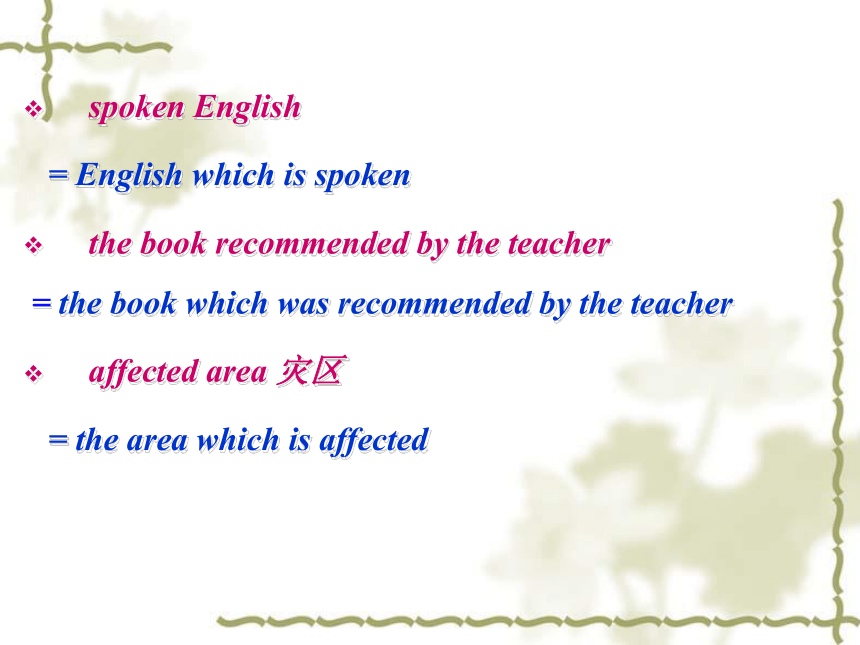
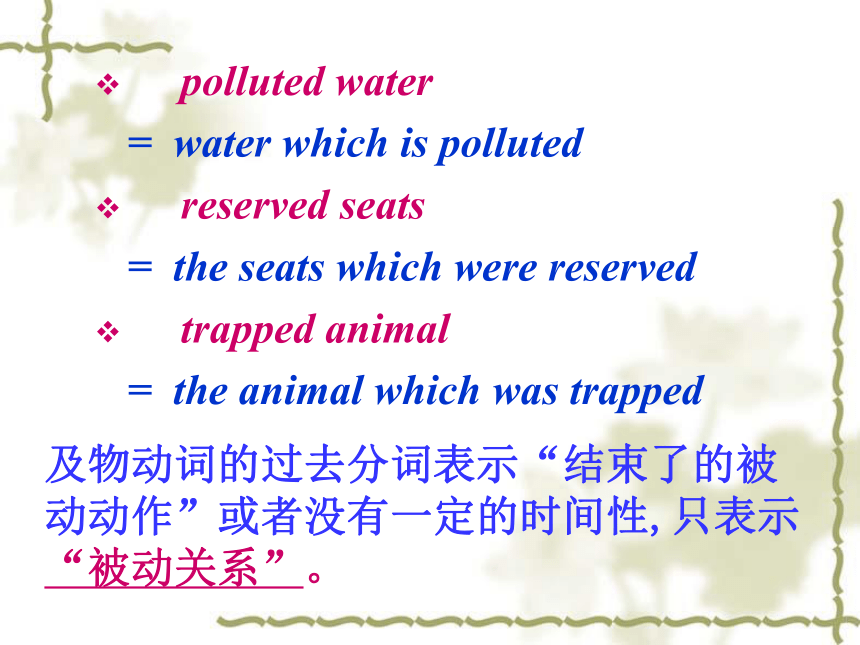
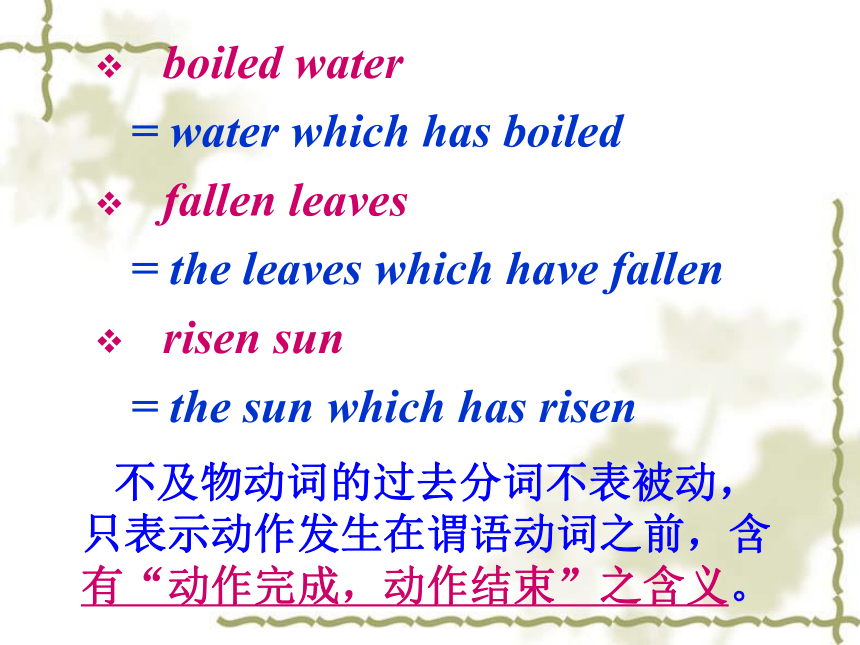

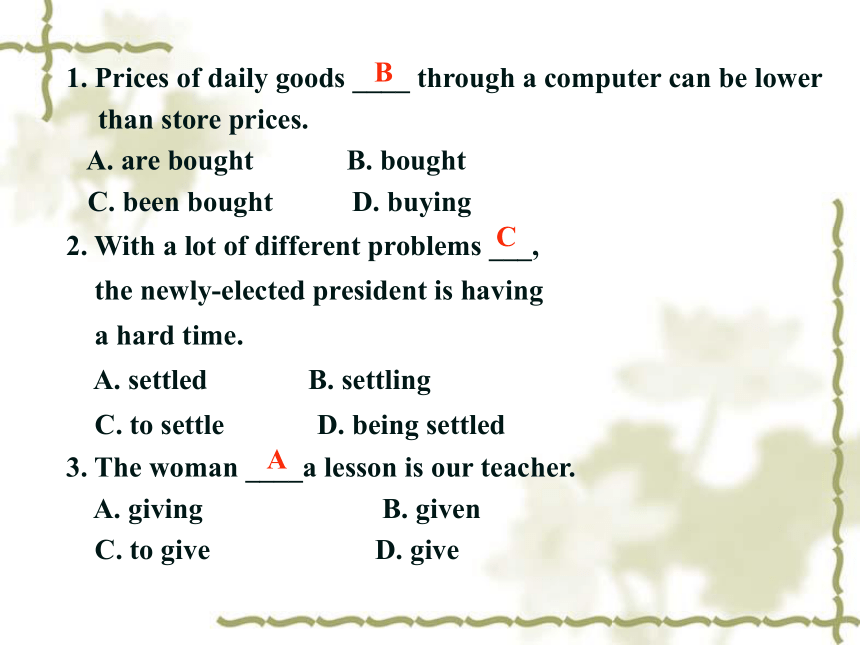
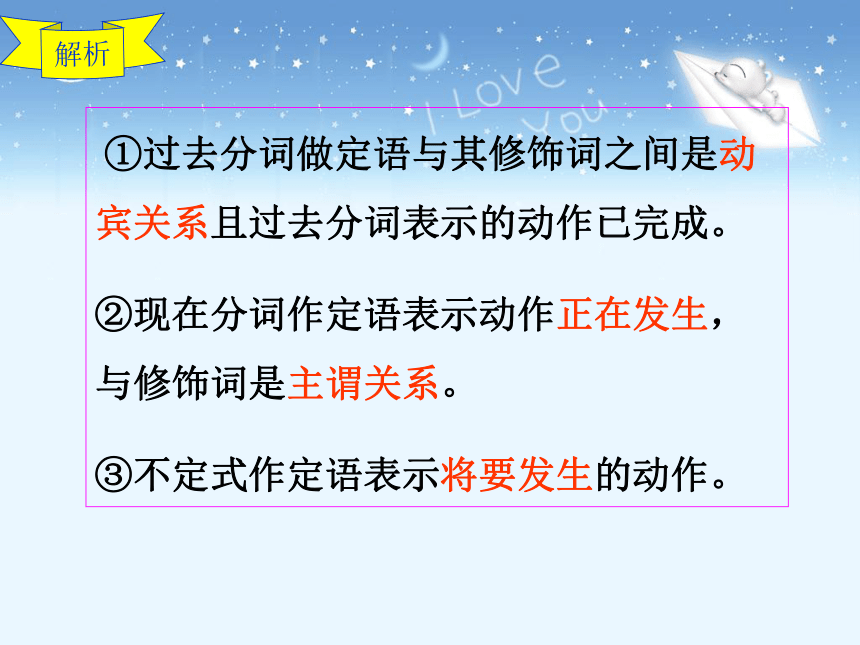
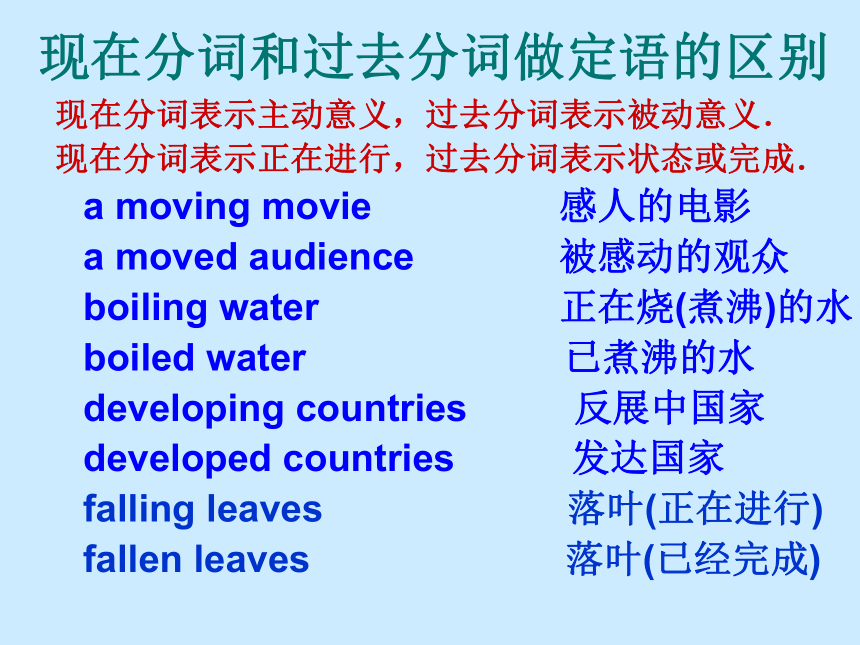
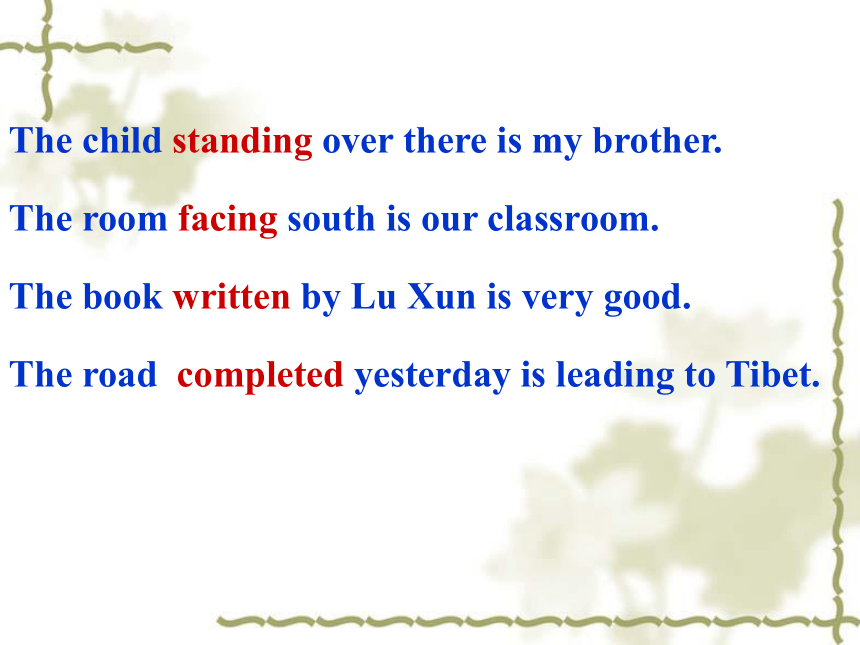
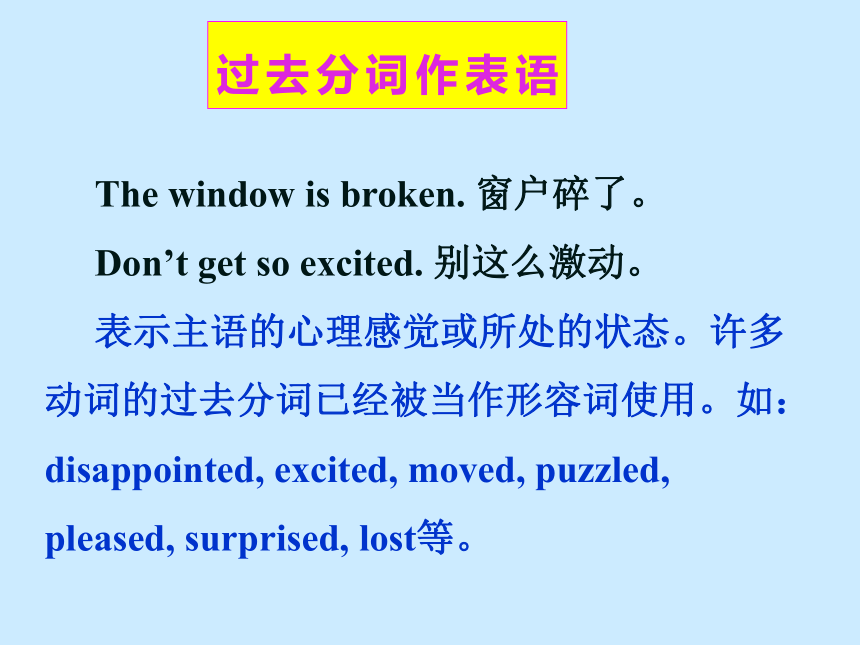
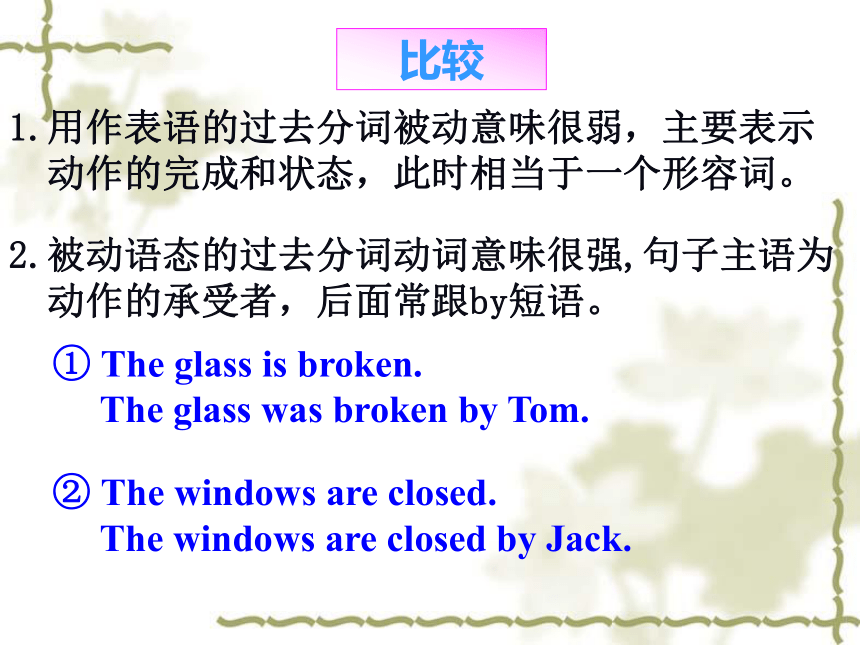
文档简介
spoken English
= English which is spoken
the book recommended by the teacher
= the book which was recommended by the teacher
affected area 灾区
= the area which is affected
及物动词的过去分词表示“结束了的被 动动作”或者没有一定的时间性,只表示“被动关系”。
polluted water
= water which is polluted
reserved seats
= the seats which were reserved
trapped animal
= the animal which was trapped
不及物动词的过去分词不表被动,
只表示动作发生在谓语动词之前,含
有“动作完成,动作结束”之含义。
boiled water
= water which has boiled
fallen leaves
= the leaves which have fallen
risen sun
= the sun which has risen
过去分词作定语也可用作非限制性定
语,前后用逗号隔开。
The books, written by Guo Jingming,
are very popular with teenagers.
这些书是郭敬明写的,深受青少年的
喜爱。
Some of them, born and brought up in rural villages, had never been to Beijing.
他们中的一些人,在农村出生并长大,从没过北京.
1. Prices of daily goods ____ through a computer can be lower than store prices.
A. are bought B. bought
C. been bought D. buying
2. With a lot of different problems ___,
the newly-elected president is having
a hard time.
A. settled B. settling
C. to settle D. being settled
3. The woman ____a lesson is our teacher.
A. giving B. given
C. to give D. give
现在分词和过去分词做定语的区别
现在分词表示主动意义,过去分词表示被动意义.
现在分词表示正在进行,过去分词表示状态或完成.
a moving movie 感人的电影
a moved audience 被感动的观众
boiling water 正在烧(煮沸)的水
boiled water 已煮沸的水
developing countries 反展中国家
developed countries 发达国家
falling leaves 落叶(正在进行)
fallen leaves 落叶(已经完成)
The child standing over there is my brother.
The room facing south is our classroom.
The book written by Lu Xun is very good.
The road completed yesterday is leading to Tibet.
3.?表示“希望”、“要求”意义的动词。如:like, order, want, wish等。
(6)我希望此事立刻得到解决。
I would like this matter settled at once.
(7)我希望5点前完成我的作业。
I wish my homework finished before five o”clock.?
注意一:过去分词在原句中作宾补时,如果原句变为被动语态,那么过去分词就在新句中作主补了。
(8)The meeting room was found thouroughly cleaned and everything arranged in good order.
人们发现会议室被彻底打扫了,一切都布置得井
有条。
注意二:使役动词have接过去分词作宾补,过去分词所表示的动作由他人完成。如:
He had his money stolen.
他的钱给偷了。(被别人偷去了)
比较:他有很多文件要打。
He had a lot of files to type.
(动作由主语自己完成)
用分词的正确形式填空
1.At that moment, I saw him ________(cross) the road.
2.To learn English well, we should find opportunities to hear English ________(speak) as much as we can.
3.She raised her voice to make herself ________(hear) by all the people in the hall.
4.It is wrong of you to leave the machine __________(run) all the time.
5.With _________________ (所有的钱都被偷了),the man can’t afford a ticket.
6.Jack soon fell asleep with _______________(灯开着).
分词作状语的基本结构
现在分词
Doing (一般式)
Having done (完成式)
Having been done (完成式的被动形式)
过去分词
Done
5.The teacher came into the classroom, following by six students.
注意一:分词短语作状语时,其逻辑主语原则上应与主句主语保持一致
Entering the room, he found a letter on the desk.
Entering the room, a letter was found on the desk.
1. While watching television,_____.
A. the door bell rang
B. the doorbell rings
C. we heard the doorbell ring D. we heard the doorbell rings
2. Faced with a bill for $10,000,_____.
A. John has taken an extra job
B. the boss has given John an extra job
C. an extra job has been taken
D. an extra job has been given to John
注意二:“with+名词+分词”的结构表示伴随状况
They pretended to be working all night with their lights burning.
She had to walk home with her bike stolen.
With the books bought, I left the bookstore.
________ in thought, he almost ran into the car in front of him.(96’全国)
?A. Losing????? B. Having lost?????
C. Lost????????? D. To lose
注意四:分词短语作状语时,通常与主句中的主语在逻辑上一致,但有时它也可以有自己独立的逻辑上的主语,这种结构称为独立主格结构。如:
Her grandfather being ill, she had to
stay at home looking after him.
----- Because her grandfather was ill, she had to stay at home looking after him.
Time Permitting, I will finish another lesson.
If time permits, I will finish another lesson.
There being no bus ,we have to walk.
Because there is no bus ,we have to walk.
当分词的逻辑主语和句子的主语不一致时,分词可以有自己的独立主语,二者构成独立主格结构。
其构成为:名词或代词的主格 + 分词
其功能为:在句中作状语
其位置为:句首,句中或句末
Our homework done, we went home.
The boy lay on his side, his eyes closed.
Her glasses broken, she couldn’t see the words on the blackboard.
Too much time given, he would do it better.
Time reduced, he finished the work on time.
1.____, he drew a conclusion.
A.The experiment having done
B.The experiment making
C.The experiment having been done
D.The experiment made
2.____ a pig on the road, the bus was stopped.
A.The driver seeing B.Having seeing
C.After seeing D.Seeing
3.____ across the railway, a train hit it.
A.While talking B.Walking slowly
C.As it was walking
D.While the sheep was walking
4.____ a fine day, they went to town
A.Being B.It being C.To be D.It was
单击此处编辑母版标题样式
单击此处编辑母版副标题样式
*
*
*
1.作定语(Attribute)
2.作表语(Predicative)
4.作状语(Adverbial)
3.作宾补
(Object complement)
过去分词
单个过去分词作定语,常放在被修饰词的
前面;过去分词短语作定语,常放在被修饰
词的后面。
1.English is a widely used language.
3.This is one of the schools built in 1980s.
过去分词作定语
2.He threw away the broken cup.
4.Prices of daily goods bought through a computer
can be lower than store prices.
B
C
A
解析
①过去分词做定语与其修饰词之间是动宾关系且过去分词表示的动作已完成。
②现在分词作定语表示动作正在发生,与修饰词是主谓关系。
③不定式作定语表示将要发生的动作。
The window is broken. 窗户碎了。
Don’t get so excited. 别这么激动。
表示主语的心理感觉或所处的状态。许多动词的过去分词已经被当作形容词使用。如:disappointed, excited, moved, puzzled, pleased, surprised, lost等。
过去分词作表语
比较
1.用作表语的过去分词被动意味很弱,主要表示
动作的完成和状态,此时相当于一个形容词。
2.被动语态的过去分词动词意味很强,句子主语为
动作的承受者,后面常跟by短语。
① The glass is broken.
The glass was broken by Tom.
② The windows are closed.
The windows are closed by Jack.
3.表示“感觉流露”的一些过去分词(如:interested,
surprised, excited, frightened, shocked)和一些过去
分词(如dressed, drunk, devoted, lost, known)常用
作表语,表示状态。其中有些仅表示状态,毫无
被动意味。
① How did the audience receive the new play?
They got very excited.
③ She was very disappointed to hear the result.
④ He’s quite experienced in teaching beginners.
② How did Bob do in the exams this time?
Well, his father seems pleased with his results.
1. As soon as he entered the city, he ____.
A. was losing B. got losing
C. grew lost D. got lost
D
C
2. What he has done is really ____.Now his parents
are _____ him.
A. disappointing; disappointed at
B. disappointing; disappointed about
C. disappointing; disappointed with
D. disappointed; disappointing by
过去分词作宾补
接过去分词作宾补的动词有以下三类:
1.?表示感觉或心理状态的动词。如:see, watch, observe, look at, hear, listen to, feel, notice, think等。
我听到有人用英语唱过这首歌。
I heard the song sung in English.
(2)他发现他的家乡变化很大。
He found his hometown greatly changed.?
2.?表示“致使”意义的动词。如:have, make, get, keep, leave等。
(3)明天我要理发。
I”ll have my hair cut tomorrow.
(4)他昨天把牙拔了。
He got his tooth pulled out yesterday.?
crossing
spoken
running
heard
all the money stolen
the light burning
What clauses do you know?
11.When it rains, I’ll go to school by bus.
时间状语从句
2.2.As the day was fine, they decided to go on a trip.
原因状语从句
过去分词作状语
3.If I go to the Great Wall tomorrow, would you like to come along?
条件 状 语从句
4.Although they did heavy work that day, they were all in high spirits.
让步状 语从句
5. She stood at the door as if she was waiting for someone.
方式状语从句
A.现在分词作状语学与练
把划线部分改写成分词短语
并说明其功能
1.When they saw their teacher, the students stood up.
Seeing their teacher, the students stood up.
*现在分词动作的发出者是( )
句子主语
*现在分词短语作( )
时间状语
After they had finished their homework,
they went home.
Having finished their homework, they went home.
*现在分词短语作( )
*Having finished their homework表现的动作在went home( ),故用分词的完成式。 ( ).
时间状语
之前
2.Because he was ill, he couldn’t go to school.
Being ill, he couldn’t go to school.
*现在分词短语作( )
原因状语
3.If you work harder at English, you will make greater progress.
Working harder at English, you will make greater progress.
*现在分词短语作( )
条件状语
4.Although they felt very tired,they kept running.
*Feeling very tired, they kept running.
*现在分词短语作( )
让步状语
Although they had been defeated many times, they continued to fight.
*Having been defeated many times, they continued to fight.
*主语是分词动作的承受者,并且强调分词的动作先于谓语动作,就用分词完成式的被动形式(Having been done)。
*现在分词短语作( )
让步状语
5.The children came into the classroom, and they laughed and talked.(并列句)
*The children came into the classroom, laughing and talking.
*现在分词短语作( )
**Laughing and talking, the children
came into the classroom.
伴随或方式状语
把下列划线部分改写成分词短语, 并说明其功能
B.过去分词作状语学与练
1.When she was asked why she did it, she began to cry.
*Asked why she did it, she began to cry.
*过去分词短语作时间状语
*过去分词的动作由主语承受
2.Because he was moved by her words, he decided to help the poor boy.
*Moved by her words, he decided to help the poor boy.
*过去分词短语作原因状语
3.If I am given more time, I’ll catch up with you.
*Given more time, I’ll catch up with you.
*过去分词短语作条件状语
4.Although he was laughed at by others, he didn’t give up his hope.
* Laughed at by others, he didn’t give up his hope.
=Although laughed at by others, he didn’t give up his hope.
*过去分词短语作让步状语
*为使状语含义更加明确,有时在分词前可加上适当连词
5.The teacher stood there and he was surrounded(包围) by many students.
*The teacher stood there surrounded by many students
= Surrounded by many students, the teacher stood there.
*过去分词短语作伴随或方式状语
分词短语作状语须注意的问题
练习: 判断正误并改正
1.Standing at the top of the hill, we can see Shiyan Town.
(√)
*现在分词所表示的动作由句子的主语发出
=When we stand at the top of the hill, we can see Shiyan Town.
2.Seen from the top of the hill, we can see Shiyan Town.
(×)
*Seen from the top of the hill, Shiyan Town can be seen clearly.
*过去分词表示的动作由句子的主语承受
=when it is seen from the top of the hill, Shiyan Town can be seen clearly.
3.Moved deeply by what he said, so he decided to help the poor girl.
(×)
*去掉so
*分词短语作状语,不能和连词连用.
Because he was moved deeply by what he said, so he decided to help the poor girl.
(× )
4.When visited at night, you must make sure the visitor is really your friend.
(√)
=When you are visited, you must make sure the visitor is really your friend.
(×)
----The teacher came into the classroom, followed by six students.
*过去分词的动作由主语承受,而现在分词的动作由主语发出.
(√)
(×)
Absorbed in deep thought, he didn't hear the sound.
Surprised at what had happened, Tom didn’t know what to do.
1、有些过去分词因来源于系表结构,作状语时不表被动而表主语的状态。
lost (迷路); seated (坐); hidden (躲);
lost / absorbed in (沉溺于); born (出身于); dressed in (穿着);
如:Faced with such a big problem, he didn't know what to do.
2、由某些动词后面加-ed转化来的形容词也具有此用法。如:frightened, satisfied, tired, disappointed等。
注意三:不表被动的特殊情况
C
独立主格结构
时间
伴随
原因
条件
让步
C
A
D
B
spoken English
= English which is spoken
the book recommended by the teacher
= the book which was recommended by the teacher
affected area 灾区
= the area which is affected
及物动词的过去分词表示“结束了的被 动动作”或者没有一定的时间性,只表示“被动关系”。
polluted water
= water which is polluted
reserved seats
= the seats which were reserved
trapped animal
= the animal which was trapped
不及物动词的过去分词不表被动,
只表示动作发生在谓语动词之前,含
有“动作完成,动作结束”之含义。
boiled water
= water which has boiled
fallen leaves
= the leaves which have fallen
risen sun
= the sun which has risen
过去分词作定语也可用作非限制性定
语,前后用逗号隔开。
The books, written by Guo Jingming,
are very popular with teenagers.
这些书是郭敬明写的,深受青少年的
喜爱。
Some of them, born and brought up in rural villages, had never been to Beijing.
他们中的一些人,在农村出生并长大,从没过北京.
1. Prices of daily goods ____ through a computer can be lower than store prices.
A. are bought B. bought
C. been bought D. buying
2. With a lot of different problems ___,
the newly-elected president is having
a hard time.
A. settled B. settling
C. to settle D. being settled
3. The woman ____a lesson is our teacher.
A. giving B. given
C. to give D. give
现在分词和过去分词做定语的区别
现在分词表示主动意义,过去分词表示被动意义.
现在分词表示正在进行,过去分词表示状态或完成.
a moving movie 感人的电影
a moved audience 被感动的观众
boiling water 正在烧(煮沸)的水
boiled water 已煮沸的水
developing countries 反展中国家
developed countries 发达国家
falling leaves 落叶(正在进行)
fallen leaves 落叶(已经完成)
The child standing over there is my brother.
The room facing south is our classroom.
The book written by Lu Xun is very good.
The road completed yesterday is leading to Tibet.
3.?表示“希望”、“要求”意义的动词。如:like, order, want, wish等。
(6)我希望此事立刻得到解决。
I would like this matter settled at once.
(7)我希望5点前完成我的作业。
I wish my homework finished before five o”clock.?
注意一:过去分词在原句中作宾补时,如果原句变为被动语态,那么过去分词就在新句中作主补了。
(8)The meeting room was found thouroughly cleaned and everything arranged in good order.
人们发现会议室被彻底打扫了,一切都布置得井
有条。
注意二:使役动词have接过去分词作宾补,过去分词所表示的动作由他人完成。如:
He had his money stolen.
他的钱给偷了。(被别人偷去了)
比较:他有很多文件要打。
He had a lot of files to type.
(动作由主语自己完成)
用分词的正确形式填空
1.At that moment, I saw him ________(cross) the road.
2.To learn English well, we should find opportunities to hear English ________(speak) as much as we can.
3.She raised her voice to make herself ________(hear) by all the people in the hall.
4.It is wrong of you to leave the machine __________(run) all the time.
5.With _________________ (所有的钱都被偷了),the man can’t afford a ticket.
6.Jack soon fell asleep with _______________(灯开着).
分词作状语的基本结构
现在分词
Doing (一般式)
Having done (完成式)
Having been done (完成式的被动形式)
过去分词
Done
5.The teacher came into the classroom, following by six students.
注意一:分词短语作状语时,其逻辑主语原则上应与主句主语保持一致
Entering the room, he found a letter on the desk.
Entering the room, a letter was found on the desk.
1. While watching television,_____.
A. the door bell rang
B. the doorbell rings
C. we heard the doorbell ring D. we heard the doorbell rings
2. Faced with a bill for $10,000,_____.
A. John has taken an extra job
B. the boss has given John an extra job
C. an extra job has been taken
D. an extra job has been given to John
注意二:“with+名词+分词”的结构表示伴随状况
They pretended to be working all night with their lights burning.
She had to walk home with her bike stolen.
With the books bought, I left the bookstore.
________ in thought, he almost ran into the car in front of him.(96’全国)
?A. Losing????? B. Having lost?????
C. Lost????????? D. To lose
注意四:分词短语作状语时,通常与主句中的主语在逻辑上一致,但有时它也可以有自己独立的逻辑上的主语,这种结构称为独立主格结构。如:
Her grandfather being ill, she had to
stay at home looking after him.
----- Because her grandfather was ill, she had to stay at home looking after him.
Time Permitting, I will finish another lesson.
If time permits, I will finish another lesson.
There being no bus ,we have to walk.
Because there is no bus ,we have to walk.
当分词的逻辑主语和句子的主语不一致时,分词可以有自己的独立主语,二者构成独立主格结构。
其构成为:名词或代词的主格 + 分词
其功能为:在句中作状语
其位置为:句首,句中或句末
Our homework done, we went home.
The boy lay on his side, his eyes closed.
Her glasses broken, she couldn’t see the words on the blackboard.
Too much time given, he would do it better.
Time reduced, he finished the work on time.
1.____, he drew a conclusion.
A.The experiment having done
B.The experiment making
C.The experiment having been done
D.The experiment made
2.____ a pig on the road, the bus was stopped.
A.The driver seeing B.Having seeing
C.After seeing D.Seeing
3.____ across the railway, a train hit it.
A.While talking B.Walking slowly
C.As it was walking
D.While the sheep was walking
4.____ a fine day, they went to town
A.Being B.It being C.To be D.It was
= English which is spoken
the book recommended by the teacher
= the book which was recommended by the teacher
affected area 灾区
= the area which is affected
及物动词的过去分词表示“结束了的被 动动作”或者没有一定的时间性,只表示“被动关系”。
polluted water
= water which is polluted
reserved seats
= the seats which were reserved
trapped animal
= the animal which was trapped
不及物动词的过去分词不表被动,
只表示动作发生在谓语动词之前,含
有“动作完成,动作结束”之含义。
boiled water
= water which has boiled
fallen leaves
= the leaves which have fallen
risen sun
= the sun which has risen
过去分词作定语也可用作非限制性定
语,前后用逗号隔开。
The books, written by Guo Jingming,
are very popular with teenagers.
这些书是郭敬明写的,深受青少年的
喜爱。
Some of them, born and brought up in rural villages, had never been to Beijing.
他们中的一些人,在农村出生并长大,从没过北京.
1. Prices of daily goods ____ through a computer can be lower than store prices.
A. are bought B. bought
C. been bought D. buying
2. With a lot of different problems ___,
the newly-elected president is having
a hard time.
A. settled B. settling
C. to settle D. being settled
3. The woman ____a lesson is our teacher.
A. giving B. given
C. to give D. give
现在分词和过去分词做定语的区别
现在分词表示主动意义,过去分词表示被动意义.
现在分词表示正在进行,过去分词表示状态或完成.
a moving movie 感人的电影
a moved audience 被感动的观众
boiling water 正在烧(煮沸)的水
boiled water 已煮沸的水
developing countries 反展中国家
developed countries 发达国家
falling leaves 落叶(正在进行)
fallen leaves 落叶(已经完成)
The child standing over there is my brother.
The room facing south is our classroom.
The book written by Lu Xun is very good.
The road completed yesterday is leading to Tibet.
3.?表示“希望”、“要求”意义的动词。如:like, order, want, wish等。
(6)我希望此事立刻得到解决。
I would like this matter settled at once.
(7)我希望5点前完成我的作业。
I wish my homework finished before five o”clock.?
注意一:过去分词在原句中作宾补时,如果原句变为被动语态,那么过去分词就在新句中作主补了。
(8)The meeting room was found thouroughly cleaned and everything arranged in good order.
人们发现会议室被彻底打扫了,一切都布置得井
有条。
注意二:使役动词have接过去分词作宾补,过去分词所表示的动作由他人完成。如:
He had his money stolen.
他的钱给偷了。(被别人偷去了)
比较:他有很多文件要打。
He had a lot of files to type.
(动作由主语自己完成)
用分词的正确形式填空
1.At that moment, I saw him ________(cross) the road.
2.To learn English well, we should find opportunities to hear English ________(speak) as much as we can.
3.She raised her voice to make herself ________(hear) by all the people in the hall.
4.It is wrong of you to leave the machine __________(run) all the time.
5.With _________________ (所有的钱都被偷了),the man can’t afford a ticket.
6.Jack soon fell asleep with _______________(灯开着).
分词作状语的基本结构
现在分词
Doing (一般式)
Having done (完成式)
Having been done (完成式的被动形式)
过去分词
Done
5.The teacher came into the classroom, following by six students.
注意一:分词短语作状语时,其逻辑主语原则上应与主句主语保持一致
Entering the room, he found a letter on the desk.
Entering the room, a letter was found on the desk.
1. While watching television,_____.
A. the door bell rang
B. the doorbell rings
C. we heard the doorbell ring D. we heard the doorbell rings
2. Faced with a bill for $10,000,_____.
A. John has taken an extra job
B. the boss has given John an extra job
C. an extra job has been taken
D. an extra job has been given to John
注意二:“with+名词+分词”的结构表示伴随状况
They pretended to be working all night with their lights burning.
She had to walk home with her bike stolen.
With the books bought, I left the bookstore.
________ in thought, he almost ran into the car in front of him.(96’全国)
?A. Losing????? B. Having lost?????
C. Lost????????? D. To lose
注意四:分词短语作状语时,通常与主句中的主语在逻辑上一致,但有时它也可以有自己独立的逻辑上的主语,这种结构称为独立主格结构。如:
Her grandfather being ill, she had to
stay at home looking after him.
----- Because her grandfather was ill, she had to stay at home looking after him.
Time Permitting, I will finish another lesson.
If time permits, I will finish another lesson.
There being no bus ,we have to walk.
Because there is no bus ,we have to walk.
当分词的逻辑主语和句子的主语不一致时,分词可以有自己的独立主语,二者构成独立主格结构。
其构成为:名词或代词的主格 + 分词
其功能为:在句中作状语
其位置为:句首,句中或句末
Our homework done, we went home.
The boy lay on his side, his eyes closed.
Her glasses broken, she couldn’t see the words on the blackboard.
Too much time given, he would do it better.
Time reduced, he finished the work on time.
1.____, he drew a conclusion.
A.The experiment having done
B.The experiment making
C.The experiment having been done
D.The experiment made
2.____ a pig on the road, the bus was stopped.
A.The driver seeing B.Having seeing
C.After seeing D.Seeing
3.____ across the railway, a train hit it.
A.While talking B.Walking slowly
C.As it was walking
D.While the sheep was walking
4.____ a fine day, they went to town
A.Being B.It being C.To be D.It was
单击此处编辑母版标题样式
单击此处编辑母版副标题样式
*
*
*
1.作定语(Attribute)
2.作表语(Predicative)
4.作状语(Adverbial)
3.作宾补
(Object complement)
过去分词
单个过去分词作定语,常放在被修饰词的
前面;过去分词短语作定语,常放在被修饰
词的后面。
1.English is a widely used language.
3.This is one of the schools built in 1980s.
过去分词作定语
2.He threw away the broken cup.
4.Prices of daily goods bought through a computer
can be lower than store prices.
B
C
A
解析
①过去分词做定语与其修饰词之间是动宾关系且过去分词表示的动作已完成。
②现在分词作定语表示动作正在发生,与修饰词是主谓关系。
③不定式作定语表示将要发生的动作。
The window is broken. 窗户碎了。
Don’t get so excited. 别这么激动。
表示主语的心理感觉或所处的状态。许多动词的过去分词已经被当作形容词使用。如:disappointed, excited, moved, puzzled, pleased, surprised, lost等。
过去分词作表语
比较
1.用作表语的过去分词被动意味很弱,主要表示
动作的完成和状态,此时相当于一个形容词。
2.被动语态的过去分词动词意味很强,句子主语为
动作的承受者,后面常跟by短语。
① The glass is broken.
The glass was broken by Tom.
② The windows are closed.
The windows are closed by Jack.
3.表示“感觉流露”的一些过去分词(如:interested,
surprised, excited, frightened, shocked)和一些过去
分词(如dressed, drunk, devoted, lost, known)常用
作表语,表示状态。其中有些仅表示状态,毫无
被动意味。
① How did the audience receive the new play?
They got very excited.
③ She was very disappointed to hear the result.
④ He’s quite experienced in teaching beginners.
② How did Bob do in the exams this time?
Well, his father seems pleased with his results.
1. As soon as he entered the city, he ____.
A. was losing B. got losing
C. grew lost D. got lost
D
C
2. What he has done is really ____.Now his parents
are _____ him.
A. disappointing; disappointed at
B. disappointing; disappointed about
C. disappointing; disappointed with
D. disappointed; disappointing by
过去分词作宾补
接过去分词作宾补的动词有以下三类:
1.?表示感觉或心理状态的动词。如:see, watch, observe, look at, hear, listen to, feel, notice, think等。
我听到有人用英语唱过这首歌。
I heard the song sung in English.
(2)他发现他的家乡变化很大。
He found his hometown greatly changed.?
2.?表示“致使”意义的动词。如:have, make, get, keep, leave等。
(3)明天我要理发。
I”ll have my hair cut tomorrow.
(4)他昨天把牙拔了。
He got his tooth pulled out yesterday.?
crossing
spoken
running
heard
all the money stolen
the light burning
What clauses do you know?
11.When it rains, I’ll go to school by bus.
时间状语从句
2.2.As the day was fine, they decided to go on a trip.
原因状语从句
过去分词作状语
3.If I go to the Great Wall tomorrow, would you like to come along?
条件 状 语从句
4.Although they did heavy work that day, they were all in high spirits.
让步状 语从句
5. She stood at the door as if she was waiting for someone.
方式状语从句
A.现在分词作状语学与练
把划线部分改写成分词短语
并说明其功能
1.When they saw their teacher, the students stood up.
Seeing their teacher, the students stood up.
*现在分词动作的发出者是( )
句子主语
*现在分词短语作( )
时间状语
After they had finished their homework,
they went home.
Having finished their homework, they went home.
*现在分词短语作( )
*Having finished their homework表现的动作在went home( ),故用分词的完成式。 ( ).
时间状语
之前
2.Because he was ill, he couldn’t go to school.
Being ill, he couldn’t go to school.
*现在分词短语作( )
原因状语
3.If you work harder at English, you will make greater progress.
Working harder at English, you will make greater progress.
*现在分词短语作( )
条件状语
4.Although they felt very tired,they kept running.
*Feeling very tired, they kept running.
*现在分词短语作( )
让步状语
Although they had been defeated many times, they continued to fight.
*Having been defeated many times, they continued to fight.
*主语是分词动作的承受者,并且强调分词的动作先于谓语动作,就用分词完成式的被动形式(Having been done)。
*现在分词短语作( )
让步状语
5.The children came into the classroom, and they laughed and talked.(并列句)
*The children came into the classroom, laughing and talking.
*现在分词短语作( )
**Laughing and talking, the children
came into the classroom.
伴随或方式状语
把下列划线部分改写成分词短语, 并说明其功能
B.过去分词作状语学与练
1.When she was asked why she did it, she began to cry.
*Asked why she did it, she began to cry.
*过去分词短语作时间状语
*过去分词的动作由主语承受
2.Because he was moved by her words, he decided to help the poor boy.
*Moved by her words, he decided to help the poor boy.
*过去分词短语作原因状语
3.If I am given more time, I’ll catch up with you.
*Given more time, I’ll catch up with you.
*过去分词短语作条件状语
4.Although he was laughed at by others, he didn’t give up his hope.
* Laughed at by others, he didn’t give up his hope.
=Although laughed at by others, he didn’t give up his hope.
*过去分词短语作让步状语
*为使状语含义更加明确,有时在分词前可加上适当连词
5.The teacher stood there and he was surrounded(包围) by many students.
*The teacher stood there surrounded by many students
= Surrounded by many students, the teacher stood there.
*过去分词短语作伴随或方式状语
分词短语作状语须注意的问题
练习: 判断正误并改正
1.Standing at the top of the hill, we can see Shiyan Town.
(√)
*现在分词所表示的动作由句子的主语发出
=When we stand at the top of the hill, we can see Shiyan Town.
2.Seen from the top of the hill, we can see Shiyan Town.
(×)
*Seen from the top of the hill, Shiyan Town can be seen clearly.
*过去分词表示的动作由句子的主语承受
=when it is seen from the top of the hill, Shiyan Town can be seen clearly.
3.Moved deeply by what he said, so he decided to help the poor girl.
(×)
*去掉so
*分词短语作状语,不能和连词连用.
Because he was moved deeply by what he said, so he decided to help the poor girl.
(× )
4.When visited at night, you must make sure the visitor is really your friend.
(√)
=When you are visited, you must make sure the visitor is really your friend.
(×)
----The teacher came into the classroom, followed by six students.
*过去分词的动作由主语承受,而现在分词的动作由主语发出.
(√)
(×)
Absorbed in deep thought, he didn't hear the sound.
Surprised at what had happened, Tom didn’t know what to do.
1、有些过去分词因来源于系表结构,作状语时不表被动而表主语的状态。
lost (迷路); seated (坐); hidden (躲);
lost / absorbed in (沉溺于); born (出身于); dressed in (穿着);
如:Faced with such a big problem, he didn't know what to do.
2、由某些动词后面加-ed转化来的形容词也具有此用法。如:frightened, satisfied, tired, disappointed等。
注意三:不表被动的特殊情况
C
独立主格结构
时间
伴随
原因
条件
让步
C
A
D
B
spoken English
= English which is spoken
the book recommended by the teacher
= the book which was recommended by the teacher
affected area 灾区
= the area which is affected
及物动词的过去分词表示“结束了的被 动动作”或者没有一定的时间性,只表示“被动关系”。
polluted water
= water which is polluted
reserved seats
= the seats which were reserved
trapped animal
= the animal which was trapped
不及物动词的过去分词不表被动,
只表示动作发生在谓语动词之前,含
有“动作完成,动作结束”之含义。
boiled water
= water which has boiled
fallen leaves
= the leaves which have fallen
risen sun
= the sun which has risen
过去分词作定语也可用作非限制性定
语,前后用逗号隔开。
The books, written by Guo Jingming,
are very popular with teenagers.
这些书是郭敬明写的,深受青少年的
喜爱。
Some of them, born and brought up in rural villages, had never been to Beijing.
他们中的一些人,在农村出生并长大,从没过北京.
1. Prices of daily goods ____ through a computer can be lower than store prices.
A. are bought B. bought
C. been bought D. buying
2. With a lot of different problems ___,
the newly-elected president is having
a hard time.
A. settled B. settling
C. to settle D. being settled
3. The woman ____a lesson is our teacher.
A. giving B. given
C. to give D. give
现在分词和过去分词做定语的区别
现在分词表示主动意义,过去分词表示被动意义.
现在分词表示正在进行,过去分词表示状态或完成.
a moving movie 感人的电影
a moved audience 被感动的观众
boiling water 正在烧(煮沸)的水
boiled water 已煮沸的水
developing countries 反展中国家
developed countries 发达国家
falling leaves 落叶(正在进行)
fallen leaves 落叶(已经完成)
The child standing over there is my brother.
The room facing south is our classroom.
The book written by Lu Xun is very good.
The road completed yesterday is leading to Tibet.
3.?表示“希望”、“要求”意义的动词。如:like, order, want, wish等。
(6)我希望此事立刻得到解决。
I would like this matter settled at once.
(7)我希望5点前完成我的作业。
I wish my homework finished before five o”clock.?
注意一:过去分词在原句中作宾补时,如果原句变为被动语态,那么过去分词就在新句中作主补了。
(8)The meeting room was found thouroughly cleaned and everything arranged in good order.
人们发现会议室被彻底打扫了,一切都布置得井
有条。
注意二:使役动词have接过去分词作宾补,过去分词所表示的动作由他人完成。如:
He had his money stolen.
他的钱给偷了。(被别人偷去了)
比较:他有很多文件要打。
He had a lot of files to type.
(动作由主语自己完成)
用分词的正确形式填空
1.At that moment, I saw him ________(cross) the road.
2.To learn English well, we should find opportunities to hear English ________(speak) as much as we can.
3.She raised her voice to make herself ________(hear) by all the people in the hall.
4.It is wrong of you to leave the machine __________(run) all the time.
5.With _________________ (所有的钱都被偷了),the man can’t afford a ticket.
6.Jack soon fell asleep with _______________(灯开着).
分词作状语的基本结构
现在分词
Doing (一般式)
Having done (完成式)
Having been done (完成式的被动形式)
过去分词
Done
5.The teacher came into the classroom, following by six students.
注意一:分词短语作状语时,其逻辑主语原则上应与主句主语保持一致
Entering the room, he found a letter on the desk.
Entering the room, a letter was found on the desk.
1. While watching television,_____.
A. the door bell rang
B. the doorbell rings
C. we heard the doorbell ring D. we heard the doorbell rings
2. Faced with a bill for $10,000,_____.
A. John has taken an extra job
B. the boss has given John an extra job
C. an extra job has been taken
D. an extra job has been given to John
注意二:“with+名词+分词”的结构表示伴随状况
They pretended to be working all night with their lights burning.
She had to walk home with her bike stolen.
With the books bought, I left the bookstore.
________ in thought, he almost ran into the car in front of him.(96’全国)
?A. Losing????? B. Having lost?????
C. Lost????????? D. To lose
注意四:分词短语作状语时,通常与主句中的主语在逻辑上一致,但有时它也可以有自己独立的逻辑上的主语,这种结构称为独立主格结构。如:
Her grandfather being ill, she had to
stay at home looking after him.
----- Because her grandfather was ill, she had to stay at home looking after him.
Time Permitting, I will finish another lesson.
If time permits, I will finish another lesson.
There being no bus ,we have to walk.
Because there is no bus ,we have to walk.
当分词的逻辑主语和句子的主语不一致时,分词可以有自己的独立主语,二者构成独立主格结构。
其构成为:名词或代词的主格 + 分词
其功能为:在句中作状语
其位置为:句首,句中或句末
Our homework done, we went home.
The boy lay on his side, his eyes closed.
Her glasses broken, she couldn’t see the words on the blackboard.
Too much time given, he would do it better.
Time reduced, he finished the work on time.
1.____, he drew a conclusion.
A.The experiment having done
B.The experiment making
C.The experiment having been done
D.The experiment made
2.____ a pig on the road, the bus was stopped.
A.The driver seeing B.Having seeing
C.After seeing D.Seeing
3.____ across the railway, a train hit it.
A.While talking B.Walking slowly
C.As it was walking
D.While the sheep was walking
4.____ a fine day, they went to town
A.Being B.It being C.To be D.It was
